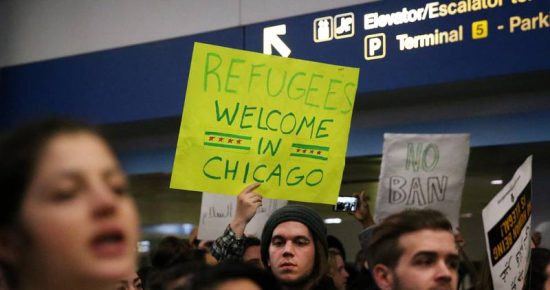You may have seen them downtown holding signs and chanting into the fall winds off Lake Michigan — Chicagoans demonstrating to support Iranians.
Earlier this month near Montrose Beach, they stuck more than 14,000 white flags in the grass to spell out “Free Iran.” The number commemorated those who have been arrested and gone missing since the explosion of anti-government protests there following the killing of a young woman who allegedly broke Iran’s strict headscarf rules.
As much as folks in the Midwest like to take pride in their politeness, we also like to protest, especially in Chicago. Throughout Chicago history, citizens here have stood up for their rights and the rights of others, including those in distant lands. They have confronted any given era’s most glaring injustices, from questioning wars and pushing for political reforms to bettering the lives of women, immigrants, minorities and laborers.
I learned of this tradition after emigrating from Syria. Coming from a part of the world where many aspired, and still aspire, to improve their living standards and political rights, I understand movements such as the Arab Spring that bring people into the streets.
The thunder of humanity. Voices growing into powerful crescendos. The belief that you can change society for the better. For those of my faith, it coursed through Chicago during January 2017 after Donald Trump took office and issued his so-called Muslim ban.
On his first days in office, the president signed an executive order prohibiting nationals from seven Muslim-majority countries from entering America. Our reaction was to channel the outrage and head to O’Hare International Airport to protest at Terminal 5.
Inspired in part by the massive 2006 protests against harsh anti-immigration laws targeting Latinos — almost half a million people gathered downtown — we Muslims were joined by a wide range of other faiths and creeds to plead for sanity, compassion and due process. Thousands at the time stood up against divisive politics and racism.
When you push forward with hope, it helps to savor the gains. As nasty as the Muslim ban felt at the time, this week it suddenly seemed long ago. The reason?
Voters in Chicago’s north suburbs just elected Nabeela Syed to the Illinois General Assembly. Not only did the 23-year-old woman become one of the youngest-ever members to serve, but she also happens to be a first-generation Muslim American who wears a hijab.

Syed’s victory is a reminder that decades ago, Chicago’s women’s suffrage movement pushed Illinois to become the first state east of the Mississippi to allow women the right to vote for president.
That is an undeniable part of this Chicago tradition — the need to keep fighting. From the Haymarket Square riot of 1886 to Occupy Chicago in 2011, people have fought against greed and to improve working conditions and economic inequality. From the Rev. Martin Luther King Jr., who campaigned hard for civil rights here, to former President Barack Obama, Chicago has inspired.
May that energy now help those battling the rotting, repressive regime that has ruled Iran for more than 40 years by distorting Islam beyond recognition.
Since September, the country has been rocked by street protests, often led by women who have had enough. What finally pushed them into direct confrontation was the death of 22-year-old Mahsa Amini.
Amini died in police custody three days after the so-called morality police arrested her for not properly covering her head, as laws there force women to do. Those same Iranian leaders fully supported the killing of more than 350,000 people in my native Syria during the civil war there.

